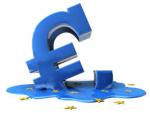This is an unexpected outcome of the Cypriot “bail out – bail in”. The fact that the Cypriot Government is now able to control money transfers and cash withdrawals is a threat for the European market. Can it still be called a free market if restrictions are applied on the ability to move money? Isn’t it also a denial of property rights?
This is a fundamental question. In the expression “free market”, there is the word “free”. It is impossible to compromise it with the word “control”. A market is either “free” or “controlled”, it cannot be both. It seems logical.
Yet, since the Cypriot Government will now decide if the euros in Cyprus can move from the island, how much can be transferred, it means that the “Cypriot Euro” is like, say, the “Algerian Dinar”: under Government watch and not free to move out of the country. As such it loses its value and is not equal to the other euros in the euro zone. Indeed, the comparison may be a like excessive, nevertheless it shows the reality of capital control.
Furthermore, money is property. So, if a bank account holder does not have the free use of his money, is unable to transfer it as wished, cannot use as much as needed for whatever purchase, it is a clear denial of property rights.
This unexpected outcome of the Cypriot crisis must be closely watched. It could hamper the European free market as weaken property rights. Not need to say it can also give bad ideas to future bailed out countries.



